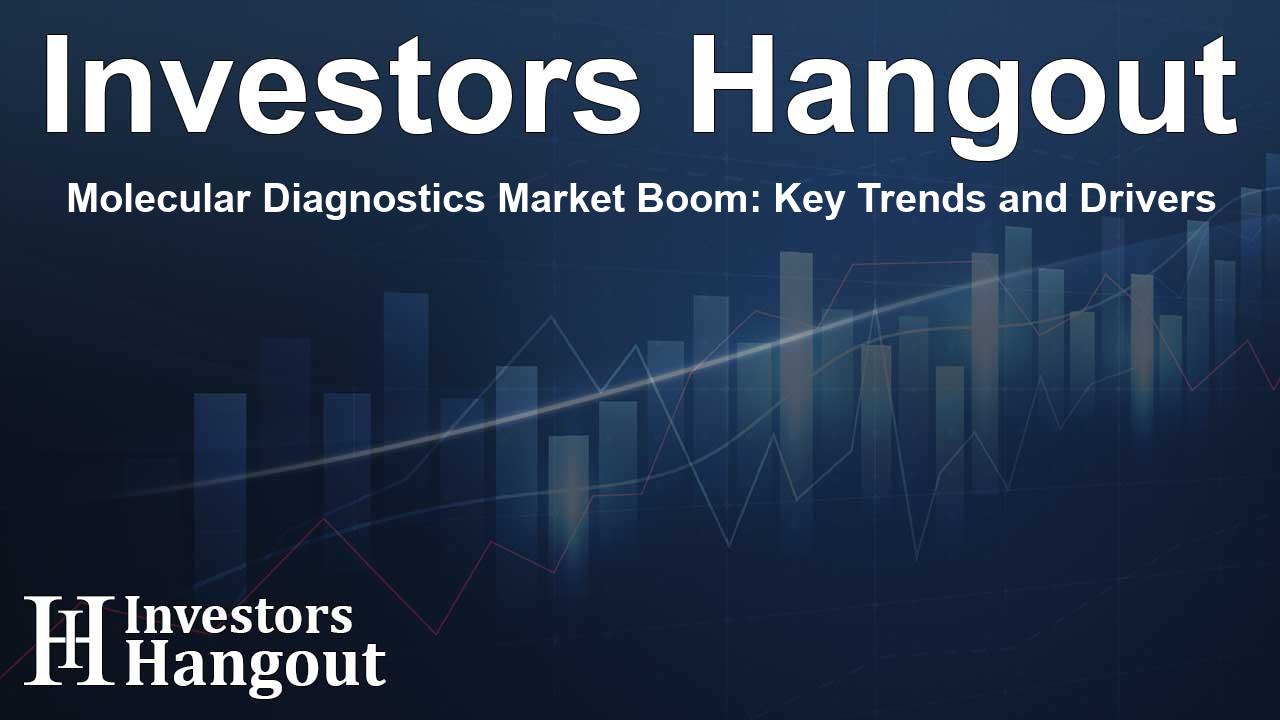Molecular Diagnostics Market Boom: Key Trends and Drivers

Overview of the Molecular Diagnostics Market Growth
The molecular diagnostics market is on the verge of a significant expansion, projected to witness a remarkable growth rate of 13.1% from its current valuation of $23 billion to reach approximately $42.6 billion by the year 2030. This surge is primarily driven by advancements in technology and an increasing demand for precise diagnostic solutions in healthcare.
Key Market Insights
This extensive research highlights critical segments within the molecular diagnostics landscape, including the various product and service types, technological innovations, and applications across multiple sectors, notably infectious diseases and oncology. Additionally, it delves into regional market trends spanning North America, Europe, Asia-Pacific, and other parts of the world, showcasing the comprehensive scope of the market's reach.
Technological Innovations
The integration of sophisticated technologies such as Polymerase Chain Reaction (PCR) and Next-Generation Sequencing (NGS) has revolutionized the way molecular diagnostics are conducted. These technologies not only enhance the speed and accuracy of testing but also extend the applications of molecular diagnostics into new areas, illustrating the dynamic progression of the field.
Emerging Trends and Applications
As we navigate through the complexities of modern health challenges, the demand for molecular diagnostics, especially in managing infectious diseases and cancer detection, has become more pronounced. Recent advancements have led to the development of non-invasive tests, enabling faster and more accurate disease detection, thus improving patient outcomes and shaping the future of personalized medicine.
Driving Factors Behind Market Growth
Several key factors are fueling the growth of this sector:
1. Rising Incidence of Infectious Diseases
The ongoing pandemic and the emergence of diseases like HIV and influenza have underscored the critical role of molecular diagnostics in ensuring rapid diagnosis and treatment. Accurate testing capabilities are essential for effective containment, particularly during public health crises.
2. Emphasis on Early Detection of Chronic Conditions
Chronic illnesses, notably cancers and cardiovascular diseases, benefit tremendously from early molecular diagnostics. Timely intervention through genetic testing and biomarker evaluations drastically improves the chances of successful treatment, validating the role of molecular diagnostics in preventive healthcare strategies.
3. Advancements in Point-of-Care Testing
Point-of-care testing represents a paradigm shift in medical diagnostics, allowing tests to be conducted in close proximity to the patient. This innovation ensures rapid results, particularly in emergency scenarios, rural locations, and during health emergencies.
4. The Rise of Companion Diagnostics
Companion diagnostics play a crucial role in personalized medicine by identifying the right treatments based on genetic markers. This practice enhances the efficacy of targeted therapies while minimizing potential side effects, showcasing an effective use of molecular diagnostics.
Market Landscape and Competitive Analysis
The landscape of the molecular diagnostics market is characterized by a mix of established players and innovative startups. Leading companies continue to innovate and compete fiercely, presenting an exciting dynamic for future developments.
Market Leaders
Prominent names in the industry include ABBOTT, AGILENT TECHNOLOGIES INC., and F. HOFFMANN-LA ROCHE LTD., all of which are at the forefront of technological advancements and market strategy implementation.
Emerging Startups
New enterprise solutions are gaining traction, including companies like Sherlock Biosciences, Inc. and Guardant Health, which are contributing significantly to the evolution of molecular diagnostics by introducing innovative products that cater to ever-changing healthcare needs.
Frequently Asked Questions
What is the projected growth rate of the molecular diagnostics market?
The molecular diagnostics market is projected to grow at a rate of 13.1% CAGR, expanding from $23 billion to around $42.6 billion by 2030.
What key factors are fueling the growth of this market?
Factors include the rising prevalence of infectious diseases, the need for early detection of chronic illnesses, advancements in point-of-care testing, and the integration of companion diagnostics in personalized treatment.
What technologies are primarily used in molecular diagnostics?
Key technologies include Polymerase Chain Reaction (PCR) and Next-Generation Sequencing (NGS), both of which enhance the effectiveness and reach of diagnostics.
Who are the major players in the molecular diagnostics market?
Major players include ABBOTT, AGILENT TECHNOLOGIES INC., and F. HOFFMANN-LA ROCHE LTD., all of which are pivotal in shaping market trends through innovation.
What are some recent trends in molecular diagnostics?
Recent trends include the expansion of applications into new disease areas like transplantation and neurological conditions, alongside a focus on non-invasive testing methods.
About The Author
Contact Addison Perry privately here. Or send an email with ATTN: Addison Perry as the subject to contact@investorshangout.com.
About Investors Hangout
Investors Hangout is a leading online stock forum for financial discussion and learning, offering a wide range of free tools and resources. It draws in traders of all levels, who exchange market knowledge, investigate trading tactics, and keep an eye on industry developments in real time. Featuring financial articles, stock message boards, quotes, charts, company profiles, and live news updates. Through cooperative learning and a wealth of informational resources, it helps users from novices creating their first portfolios to experts honing their techniques. Join Investors Hangout today: https://investorshangout.com/
The content of this article is based on factual, publicly available information and does not represent legal, financial, or investment advice. Investors Hangout does not offer financial advice, and the author is not a licensed financial advisor. Consult a qualified advisor before making any financial or investment decisions based on this article. This article should not be considered advice to purchase, sell, or hold any securities or other investments. If any of the material provided here is inaccurate, please contact us for corrections.
